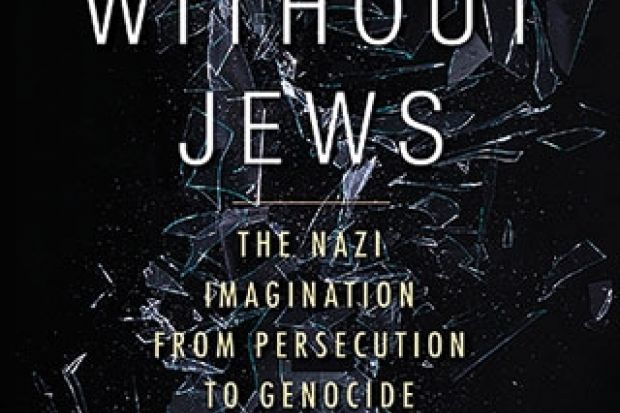This seems like an attempt to combine two books in one. First, much of it consists of a detailed chronicle of the Third Reich’s persecution of the Jews, from the early excesses of 1933 through the Nuremberg racial laws of 1935 and the Kristallnacht of November 1938 to the “Final Solution” of Auschwitz, all set against the contemporary political and military background. Its other central theme, which is presented as its main purpose, is a much more ambitious venture in the history of ideas: an attempt to show that the main reason why the Holocaust happened lay not in a basically racialist anti-Semitic ideology, nor (in the end) in the momentum of a banal extermination machinery, but rather with Hitler’s quasi-religious obsession with annihilating the entire tradition and memory of Jewishness, from the Old Testament onwards, as a force antithetical to Christianity as well as to Nazism.
Such an attempt to trace the influence of “pure” ideas right down to the level of day-to-day political or other actions is notoriously difficult, and Alon Confino tackles it by combining material from his two approaches. He concentrates heavily, for instance, on Kristallnacht, when Nazi-inspired mobs throughout Germany savagely attacked Jews and their property: as Confino points out, the aggressors usually took special care – as well as burning down the local synagogue – to defile and destroy the Jews’ sacred writings. This shows, he argues, that the “November pogrom” was motivated not only by the Nazis’ more obvious anti-Semitic arguments (the Jews were not German, they were criminally dishonest, they were all Bolsheviks or super-capitalists, the corrupters of the German nation’s identity) but also – and fundamentally – by the conviction that Jewishness, the entire history of “the people of the book”, had to be eliminated.
One difficulty with this kind of example – although less so with Confino’s account of the efforts of Nazi theologians to prove that the Old Testament was a worthless forgery – is that the strands of evidence, although intrinsically valid, may not carry sufficient weight to make a compelling overall case. There are indeed, in Confino’s contemporary sources, some indications that the Holocaust’s perpetrators saw their mission as the abolition of the entire history and tradition of the Jews, but the impression remains that their main motives were the traditional anti-Semitic ones. There was also, of course, once the war had started, the widespread argument that the Jews deserved drastic punishment for having started it.
If the purpose of the author’s sometimes lengthy accounts of contemporary events was to support the case for his central theme, they do not always achieve this, and there are some surprising gaps: for instance, there are references to the vital Wannsee Conference of January 1942 but no clear account of what was decided there. Again, a book that sets out to show that previous scholarship has neglected an essential explanatory factor, and to provide the necessary correction, should surely refer in rather more detail to the literature being criticised.
Overall, A World Without Jews is useful in making us think about its central thesis. It also brings out some of the dilemmas of Nazi policy, including the conflict between the wish to destroy every trace of Jewish history and the idea of preserving some record of a vanished past: Confino illustrates this by the story of a small-town museum director who, on Kristallnacht, persuaded the fire brigade to extinguish the fire already ravaging the synagogue in order to save some of the contents as relics for his museum.
A World Without Jews: The Nazi Imagination from Persecution to Genocide
By Alon Confino
Yale University Press, 296pp, £20.00
ISBN 9780300188547
Published 11 June 2014
Register to continue
Why register?
- Registration is free and only takes a moment
- Once registered, you can read 3 articles a month
- Sign up for our newsletter
Subscribe
Or subscribe for unlimited access to:
- Unlimited access to news, views, insights & reviews
- Digital editions
- Digital access to THE’s university and college rankings analysis
Already registered or a current subscriber? Login





